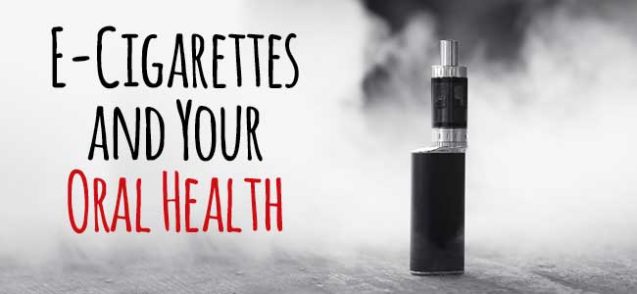E-Cigarettes and Your Oral Health: The Smokeless Threat to Your Smile
For many smokers, e-cigarettes seem like the best answer to avoiding the nasty side effects of smoking traditional cigarettes, including the odor and the staining of teeth, skin, and clothing. Though e-cigarettes still contain the highly addictive chemical nicotine, tobacco and other harmful elements are eliminated from the electronic smoking process, or what some refer to as “vaping.”
The growing popularity of e-cigarettes and vaping, especially among young people, has caused a rise in concern over the lack of knowledge around the effects it has on health. While clinical studies are currently underway, in 2014 the U.S. Food and Drug Administration (FDA) released a statement saying “e-cigarettes have not been fully studied, so consumers currently don’t know the potential risks of e-cigarettes when used as intended, how much nicotine or other potentially harmful chemicals are being inhaled during use, or whether there are any benefits associated with using these products.”
Even though the FDA isn’t yet ready to comment on health risks associated with vaping, dentists are able to speak to how these new smoking devices threaten your oral health. Nicotine is harmful to your teeth and gums, even in the absence of tobacco and other chemicals traditionally found in cigarettes. Electronic cigarettes still deliver nicotine to their users through the mouth, throat, and lungs. The following are some of the consequences that come with using smokeless cigarettes.
Gum Disease: One of the telltale signs of gum disease is swelling of the gums caused by irritation. Nicotine reduces blood flow, preventing swelling, which can mask the presence of gum disease — causing your dentist to miss the symptoms and allowing the disease to progress.
Gum Recession: Lack of blood flow to the gums keeps the tissue from receiving the nutrients it needs to survive. Over time the skin dies and recedes.
Bad Breath: Nicotine restricts your body’s ability to produce saliva, which makes your mouth vulnerable to harmful bacteria and tooth decay. Combined, dry mouth and bacteria lead to halitosis, which can be embarrassing and can affect your self-esteem.
Intense Grinding: As a stimulant, nicotine causes muscles to tighten and spasm against the user’s will. It can cause sleep disturbances such as insomnia and grinding of the teeth. Grinding, especially while sleeping, can be damaging to teeth and result in the loss of tooth enamel, as well as chipping, cracking, and breaking of teeth.
If you want to maintain your best oral health, avoiding any type of smoking is recommended. If you do choose to smoke, keeping it to the minimum and maintaining your best at-home oral hygiene practices as well as your routine visits to the dentist is important.
If you see signs of periodontal disease (including red, swollen, bleeding, or receding gums) or experience bad breath, painful chewing, or loose teeth, make sure to contact your dentist immediately. There are treatments you can receive that will help keep your teeth and gums in the best possible condition. Two such treatments include:
- Professional dental cleanings
Plaque and tartar are removed from above and below the gumline. If you have gingivitis or signs of periodontitis, you will be required to have this level of cleaning twice a year or more. - Scaling and root planing
Plaque and tartar are scraped away from both above and below the gumline while under local anesthetic (scaling). Rough spots on the tooth root are then smoothed out (planing). Locally applied medications, such as antimicrobials and antibiotics, may be used.
If you are experiencing jaw tightness or pain, and you think you might be grinding your teeth, your provider can fit you with a mouthguard that will protect your teeth while you sleep.
It can be difficult to share your habits with your dentist. At Douglas B. Weber, DDS, we treat our patients with respect and compassion. We are here to help you be your healthiest self. If you use e-cigarettes and are concerned about how they may be affecting your oral health, call us today and set up a consultation. We will help you protect your teeth and maintain your natural smile.
More

